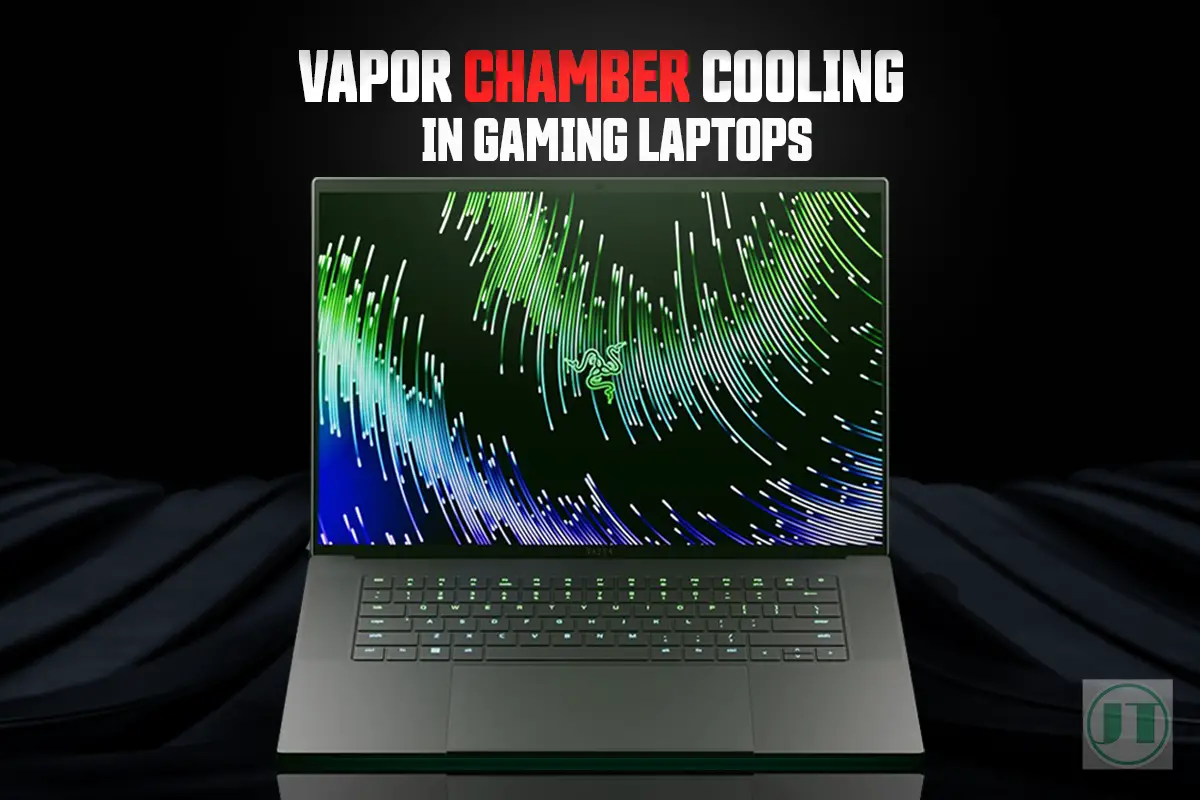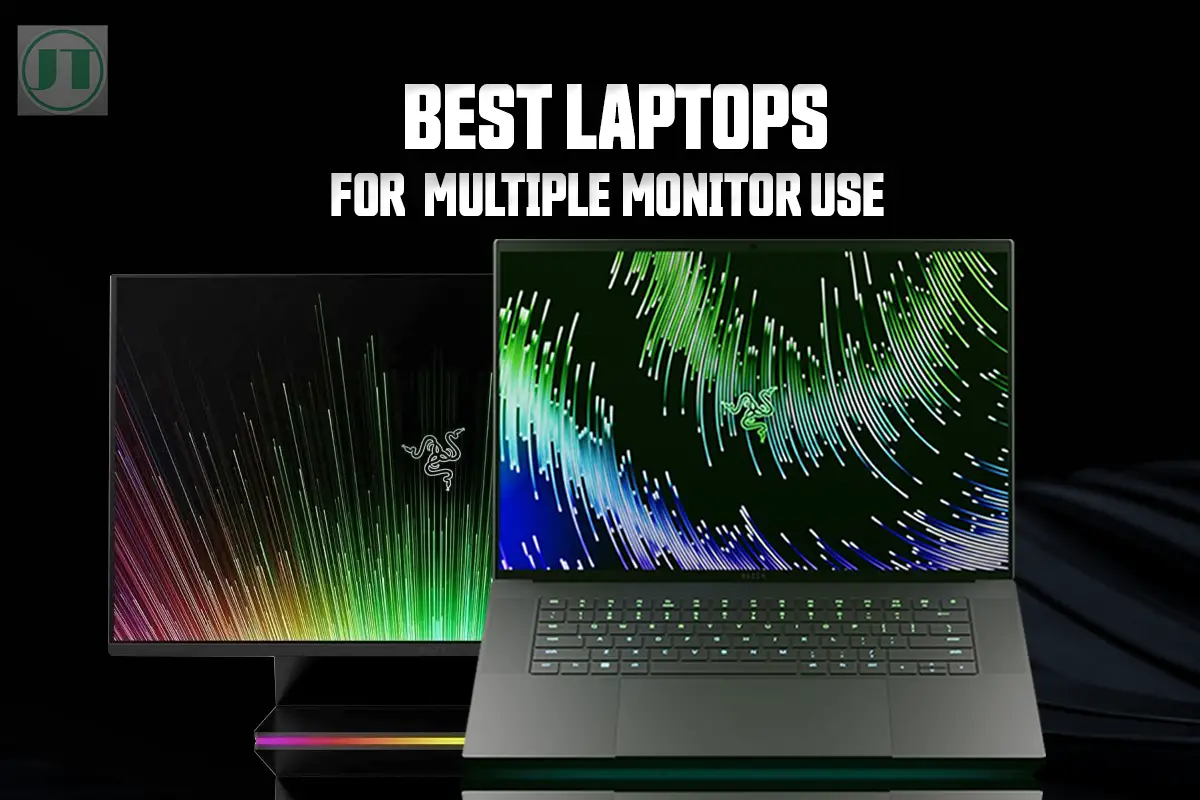As a gaming laptop enthusiast and owner of both a vapor chamber cooling laptop and a gaming laptop with a traditional cooling system with heatpipes. I’ve experienced the significant impact of these advanced cooling technologies on gaming performance and user comfort.
With laptops becoming slimmer and more powerful, managing heat is crucial. And that is where vapor chamber cooling comes in to play. A cutting-edge technology offers enhanced thermal performance, quieter operation, and the potential for sleeker designs.
Here we will explore the science behind vapor chamber cooling. Compare the cooling system to traditional cooling methods, and examine the laptop brands utilizing the technology.
What Is A Vapor Chamber Cooling Laptop?
A vapor chamber cooling laptop utilizes advanced thermal technology to effectively manage heat dissipation in powerful gaming computers. Unlike traditional cooling methods that rely on heatpipes, vapor chamber cooling involves a sealed vacuum vessel lined with a porous wick structure along the chamber walls.
The wick becomes saturated with a working fluid that goes through cycles of evaporation and condensation. This vaporization of the fluid enables rapid dissipation of heat generated by components like the graphics card and processor.
By leveraging the vapor chamber’s strengths, gaming laptop makers can build powerful systems that stay cool under heavy loads while retaining slim and lightweight designs. This vaporization cooling technology allows substantial performance in an Ultrabook form factor.
Benefits of Vapor Chamber Cooling
- Enhanced thermal performance – The phase transition of the working fluid spreads heat more efficiently. This enables better cooling of high TDP components.
- Quieter operation – Vapor chambers have no moving parts, resulting in silent functioning.
- Thinner form factors – With superior cooling systems, laptop manufacturers can create slim and portable gaming laptops that run cooler.
- Lightweight build – Effective thermal management reduces the need for bulky cooling elements like heat sinks and multiple copper heatpipes.

How Does the Vapor Chamber Cooling System Work?
Vapor chamber cooling is an efficient thermal management technology used in high-performance laptops such as the Lenovo Legion, Razer Blade, ASUS ROG, MSI GE76 Raider, and many Dell Alienware models.
The vapor chamber system works through an internal phase change process. Inside the sealed vapor chamber, a liquid cooling fluid absorbs heat from hot components like the CPU and GPU. The heat causes the fluid to evaporate into a vapor.
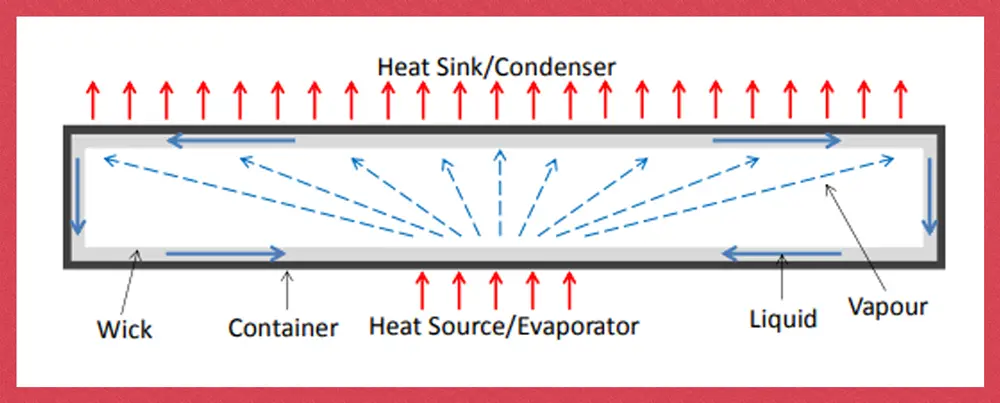
The vapor then travels to cooler areas inside the chamber where it condenses back into a liquid, releasing its stored heat. The condensed liquid returns to the heat source through capillary action, which is made possible by the chamber’s porous wick lining that transports the fluid like a sponge. This internal evaporation, condensation and capillary effect creates a continuous self-sustaining cycle that efficiently draws heat away from the laptop’s chips.
Compared to traditional heatsinks, vapor chamber cooling enables better thermal performance, quieter operation, and thinner form factors in laptops. The phase change process spreads heat more effectively and allows for slimmer, lighter designs.
By leveraging vapor chamber technology, laptop manufacturers can build powerful systems that stay cool under heavy loads while retaining portability. The vaporization cooling enables substantial performance gains in compact laptop and device designs.
The Benefits Of Vapor Chamber Cooling Laptops?
There are many benefits to owning a notebook with the vapor chamber thermal system. As, unfortunately gaming laptops do get quite hot while underload like when gaming, or rendering videos. So, the need for a gaming computer with good cooling capabilities is great. Poor cooling can lead to overheating, thermal throttling, and a shorter laptop lifespan.
Powerful gaming notebooks with the vapor chambers are less likely to overheat. Offer more consistent performance, and deliver lower average temperatures as shown in the stress tests below. There are several advantages to choosing a laptop with the vapor chamber system, compared to regular laptops or gaming notebooks with traditional heatpipe cooling methods.

Enhanced Thermal Performance
Vapor chamber laptops offer superior thermal management compared to traditional cooling solutions, like air cooling or heatpipe systems. By leveraging the phase change process, the vapor chamber systems can efficiently dissipate heat from core components. Reduce the risk of overheating, offer improved processing performance and extend the devices lifespan.
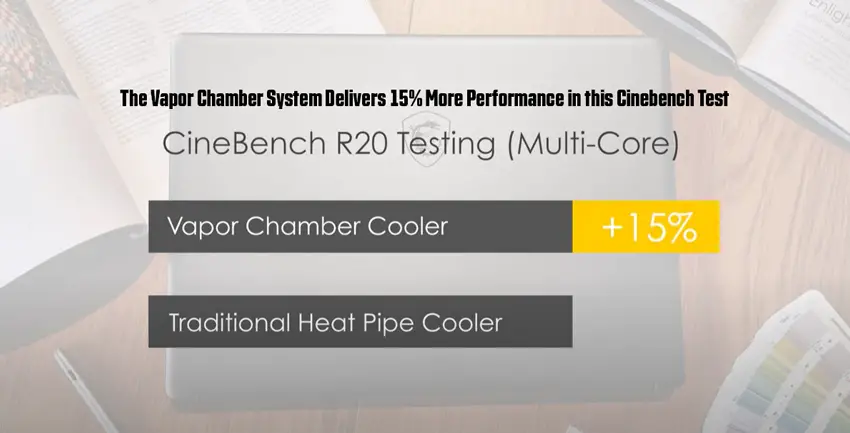
Thinner and Lighter Designs
Vapor chamber cooling systems are more lightweight and compact compared to traditional hybrid cooling systems with heat pipes. Enabling laptop manufacturers to design thinner and lighter gaming laptops without compromising on device performance. Traditional cooling methods often require large heat sinks and multiple heat pipes, which adds bulk.
Whisper-Quiet Operation
Another key benefit of gaming notebooks with the vapor chamber thermal system is the minimal noise levels during operation like when running demanding AAA games. Traditional cooling systems with heatsink, and copper heatpipes, are often noisy, as the fans have to work much harder to dissipate the heat generated by the hardware.
When comparing the noise levels when gaming between the Razer Blade 15, which features a vapour chamber thermal system. With the HP Omen 15, a traditional cooling system. When underload, there is a huge difference in the noise levels created from the fans.
Advantages of Vapor Chamber Thermal Systems
- Improved thermal performance
- Slower Temperature Increases
- Slimmer designs
- Reduced Noise Levels
Challenges of Implementing Vapor Chamber Cooling
One of the reasons why laptops with vapor chambers are often more expensive than regular laptops or traditional air cooling laptops. Designing these gaming laptops demands precision and attention to detail to ensure effective heat transfer and higher performance.
The higher cost of these gaming systems with vapor chambers stems from the need for specialized materials, precision manufacturing, and complexities of managing the working fluid. However, the higher cost does make gaming notebooks with vapor chambers less affordable.
But, in my opinion, investing in a gaming computer with the vapor chamber thermal system is a worthy investment, especially if you plan to use the device for demanding tasks.
Comparing Vapor Chambers To Traditional Cooling Methods
Laptop cooling is crucial for ensuring optimal performance, user comfort, and device longevity. With the emergence of vapor chamber cooling in laptops. It is important to understand how this thermal system compares to traditional cooling methods like heat pipes and air cooling.
In this section, I will explore the different types of computer cooling systems, highlighting the key differences between each laptop cooling technique. And examine the effectiveness, design implications, and advantages of each thermal system.

Vapor Chamber Vs. Heat Pipe Laptop
Heat pipes and vapor chambers are two-phase cooling systems that utilize evaporation and condensation to transfer heat away from components. However, they differ in design and efficiency. Heat pipes are hollow metal tubes containing a wick and coolant and can be bent into shapes but only transfer heat in one direction.
Vapor chambers are flat sealed vessels with porous wick linings. While vapor chambers cannot be bent, they provide multidirectional heat spreading. Additionally, vapor chambers handle larger heat loads and spread heat more evenly than a heat pipe.
This makes vapor chambers better for effectively cooling high-performance gaming laptop components like the graphics cards that produce substantial amounts of heat. The vapor chamber’s superior heat distribution and capacity gives these notebooks effective thermal management without compromising performance.
More Content: Our full in depth guide: Vapor Chambers vs Heat Pipe Laptops, explaining the key differences with these two cooling systems.
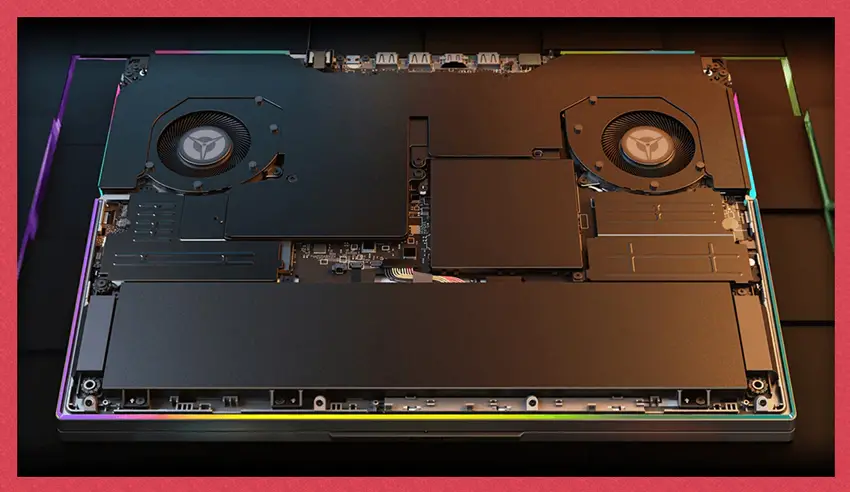
Air Cooling Vs. Vapor Chamber Cooling
Laptops with air cooling systems relies on fans to blow air over heat sinks, which absorb heat from the laptop’s components. The air cooling method is relatively simple but less efficient, as it requires more space for larger heat sinks and multiple fans.
Vapor chamber cooling uses the evaporation and condensation of a working fluid to efficiently transfer heat away from the laptops microprocessors. Allows for slimmer laptop designs, better thermals, and an overall quieter operation and lower temperatures when gaming.
Vapor Chamber Vs. Liquid Cooling
Liquid cooling systems use circulating liquid to transfer heat from the computers components to a radiator, where the heat is then dissipated into the air. This method is highly effective at handling large amounts of heat, but can be complex, expensive, and bulky.
Vapor chamber cooling laptops offers similar benefits of efficient heat dissipation without the need for pumps, tubes, or a radiator, making it a more compact solution.
Should You Invest In A Vapor Chamber Gaming Laptop?
Based on personal experience with air cooled gaming notebooks and vapor chamber cooling laptops. There is a significant difference in thermal performance and fan noise levels between the two thermal systems. With the vapor cooled laptop offering a smoother experience, lower hardware temperatures like the CPU and graphics card.
Why invest in a computer with a vapor chamber cooling system?
- Enhanced Performance: Provides superior thermal management, preventing overheating during intense gaming sessions or heavy workloads.
- Quieter Operation: Offer minimal noise compared to traditional air cooling solutions.
- Sleeker Designs: Vapor chamber cooling allows for thinner and lighter laptop designs.
Here Are A Few Drawbacks:
- Higher Cost: Tend to be more expensive than regular laptops with traditional cooling solutions, due to the specialized materials, and design complexities.
- Limited Availability: The range of gaming laptops available are limited.
- Handling High Temps: Not effective at dissipating heat when room temperature is high.
Best Vapor Chamber Cooling Laptops
Some of the best gaming laptop models featuring vapor chamber cooling technology. Including the Razer Blade, Dell Alienware, and Lenovo Legion range of notebooks. Each of these laptop brands have several of the best vapor chamber cooling gaming laptops, tested by us, Notebookcheck and many other reputable online review type websites.

Razer Blade Range: The Razer Blade series, known for their lightweight designs and high-performance hardware. Incorporates vapor chamber cooling in their gaming notebooks.
Dell Alienware Range: Dell’s gaming-focused brand, Alienware laptops feature the advanced vapor chamber cooling systems. But, some of their high-end gaming laptops, are not as lightweight but still ensures efficient heat dissipation.
Lenovo Legion: Lenovo’s newer Legion series of gaming laptops utilize vapor chamber cooling systems. Their powerful gaming laptops are the perfect choice for budget conscious gamers looking for a laptop that maintains top-notch cooling performance.

Is a Vapor Chamber Good In a Laptop?
Yes, vapor chamber cooling is an effective thermal management solution for laptops. The sealed vacuum vessel with porous wick lining leverages evaporation and condensation of a fluid to efficiently dissipate heat from components.
Vapor chamber cooling systems enables enhanced performance, quieter operation, and thinner form factors. By spreading heat rapidly, vapor chamber’s prevent overheating in compact, high-powered gaming laptops and outperforms laptops with heatpipes and traditional cooling methods, making it advantageous for thermal regulation in laptops.
Conclusion
In conclusion, vapor chamber cooling is an innovative and efficient cooling solution that offers numerous benefits for high-performance gaming laptops, and other laptops used for heavy content creation. As the technology continues to evolve, we can expect even more efficient and compact cooling solutions to emerge, and make gaming on laptops even more efficient.
Thank you for reading this overview of vapor chamber cooling in laptops. If you found this information helpful, be sure to subscribe to my newsletter for more content. If you have any questions or comments, feel free to leave them below.
- Sources: Laptop Cooling, Core.ac.uk
- Sources: Vapor Chambers – HeatSinks.files

